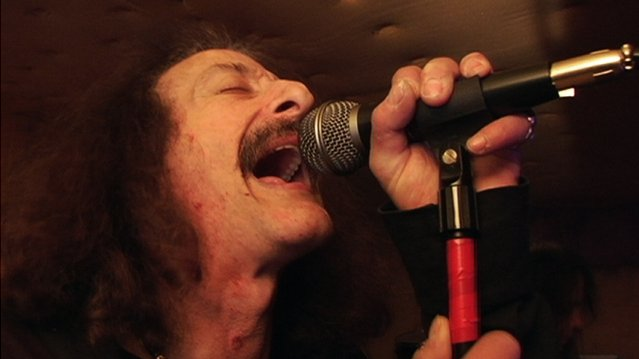Searching for Bobby Liebling

ABOVE: BOBBY LIEBLING IN LAST DAYS HERE.
Last Days Here is a rock-‘n-roll documentary that sidesteps the roll and focuses on rock bottom. Sitting on a torn couch, in a room littered with years of debris, is Bobby Liebling—the rock star who never was. Barely intelligible, smoking crack, living in the basement of his parents’ house, it’s easy to see the title of the film as a forewarning. The film navigates the shaky career of Liebling and his band Pentagram—metal pioneers, for years constantly on the verge of making their big break—along with Liebling’s struggles to forge a life outside of music, it seems, for the first time.
Interview spoke with directors Don Argott and Demian Fenton about complicated process of documenting a troubled subject, the twin journeys of the film, and not making a traditional rock doc.
CRAIG HUBERT: Were you fans of Pentagram before making the film, and did you know the condition Bobby was in?
DEMIAN FENTON: Don and I both love old ‘70s rock. I had always heard stories on the underground. Rumors about Bobby would float around, like he had done so much heroin his arms were going to be amputated, or that he had died on stage and been revived. So he seemed like quite an intriguing character. Then I met Sean Pelletier, who was trying to help Bobby get his music out. That is how it all happened.
HUBERT: Did you have other motives at the beginning, hoping to get Bobby back on a stage again?
DON ARGOTT: The idea came about when Pellet and Demian were talking about Bobby and his music. Pellet’s mission at that point was for Bobby to make one last record with the original guys in the 1970s lineup of Pentagram. Pull it together one last time. It had this very conventional beginning, middle, and end process of a guy who was down and out and trying to get his life back together, and more importantly, make this record. We really felt there was enough of a narrative thread to hook the movie on that. What we found out was that it was never going to happen. What we were documenting was much more interesting and, inevitably, better than what we ever could have hoped it would turn into. Like many documentaries, they start out with one direction and it takes a totally different turn, always for the better.
FENTON: That being said, we as filmmakers weren’t there to revive anyone’s career or anything like that. We were there to follow people trying to do that and document their journey.
HUBERT: There are a few moments in the film where a wall is broken, and you, the filmmakers, become a more central part of the film. I’m thinking specifically of the voicemail messages Bobby’s mother leaves you, which you incorporate into the film. How do you navigate that difficult relationship between filmmaker and subject?
FENTON: It was really hard. With a film like this, we didn’t have the budget, so it took a really long time. The lines between filmmaker, friend, therapist, helper, all blurred together. I love Bobby’s mom, and I love Bobby. You want to see them do well. What Don was talking about before, we went there to document this guy trying to make a go at playing rock-‘n’-roll, and what we realized pretty quickly is that he wanted to make a go at just living his life for the first time. That being the story, and us being, I would say, a positive force in his life—you get sucked into that. You want to help someone make decisions that would help them get in a bad situation. I was never out there trying to sell people on Pentagram. But when you get a call from Bobby’s mom at seven in the morning that he’s missing for five days, you can’t ignore that.
HUBERT: Is there a point where, as a documentarian, you feel like you’re too deep into the story?
ARGOTT: There were plenty of times where that line was blurred, because Bobby ended up in some really serious situations that transcend that line between, “Wait a minute, I’m just a guy with a camera” versus “I’m now involved in this.” Pellet was really that first wave, or first line of defense, between Bobby and us. We were working vicariously through Pellet. His concerns were our concerns. It would be weird if Demian, or myself, were the ones who were bailing him out of jail. When Bobby was in trouble, Pellet was the guy who bailed him out. We were able to follow Pellet when he was doing all these things. I think what was interesting is that Demian’s cell phone became this weird confessional, where he was the hub of everybody going through dealing with Bobby’s life. He was the one still objective person in the process that everybody could call.
FENTON: When you’re earning peoples trust, you don’t calculate, “This is how we’re going to get their trust,” and go in like that. To earn their trust is to respect the situation that they’re in and understand people can get in these places, and be thoughtful about it. I think that was a really welcome addition to this experience everybody was having.
HUBERT: You mentioned Sean Pelletier, who is an interesting figure in this story.
FENTON: Early on, Pellet always had these musical goals. He talks early on in the film about Bobby needing to do one last thing here and put it in the history books before he is dead. Bobby wanted to live life. They needed to figure out how music would play a role in either side. Pellet needed to learn that Bobby needed to be loved, and get out of his mother’s basement, and learn to live. Bobby needed to learn that in some ways music could help him. There was conflict all along the way. Their approach, and their end game, needed to be mapped out.
ARGOTT: When we first started out, Pellet was never supposed to be a character in this. The first day we went to visit Bobby, we all went down together, and we only shot Bobby. It became clear the more we continued to shoot that Pellet was so immersed that it would really be negligent to not include his goals and journey along with that. It was at this point when the film really opened up to be something that it ultimately became.
FENTON: I’ve always seen the film as much less of a rock doc and much more something like Searching for Bobby Fischer.
HUBERT: I’m always interested in the moment when documentarians know when to stop. You’re collecting all this footage for a long period of time; you could ostensibly go on forever.
ARGOTT: That’s a weird thing about documentaries. If they’re based on real life, they never really stop. Life keeps going on. You have to create a narrative that, in a way, works for the film you’re trying to make. Within that, there need to be stakes and goals, and some kind of closure. For us, there was this concert, which provided an end game. Will he make it and play one last show on stage? Once we had that, we knew we had enough to pull the film together.
FENTON: There are two journeys here. There is this musical journey, and the goals attached to that, and the journey of Bobby wanting to have a life.
HUBERT: Has Bobby seen the film, and what does he think of it?
FENTON: He’s definitely seen the film, I watched it with him. He cried a lot when he watched it. It’s really tough for him to see those early scenes and see the state he is. He’s in a much better place now. Like all documentary subjects, they have an idea of how their life story would be told. Bobby thinks it should be more music, but we weren’t going for the rock doc. We wanted this story about life. But he loved it. I saw him two days ago. The journey we all went on, on camera and off has been this collective experience. To see where he is now in life is a beautiful thing.
LAST DAYS HERE IS OUT IN LIMITED RELEASE TOMORROW.






